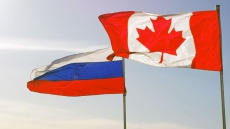ATLANTA — All-night negotiations have led to a day of suspense at major trade talks Saturday, which could be extended for a third day in a row amid persistent irritants.
"Ministers have agreed to stay (until Sunday) if necessary," one source said, casting doubt on earlier expectations that a 12-country Trans-Pacific Partnership might be announced within hours.
The two-day ministerial meeting in an Atlanta convention centre, if it drags into Sunday, will have lasted five days amid widespread desire from proponents to get a deal done now before elections in Canada, the U.S., Peru and Japan.
The biggest potential impediment to a massive new trade deal across the Pacific rim is believed to be next-generation pharmaceuticals, where competing political pressures in the United States and Australia have those countries locked in a staredown.
Stakeholders at the meeting say the American Congress might not pass the deal if it doesn't offer eight-year exclusivity rights to makers of biologics medicines, which is already down significantly from the U.S.'s current protection of 12 years. The Austalian government, meanwhile, faces political pressure at home to avoid granting anything beyond five.
Canada is somewhat of a bystander in that dispute. It already applies the eight-year standard.
The last big sticking point involving Canada is dairy. As negotiators worked until at least 4 a.m., sources say Canada, the U.S., New Zealand and others were involved in a multi-sided talks about providing more access to each other's milk, cheese and butter.
Canada's dairy sector is 90-per-cent closed to foreign competition and the government is under political pressure — especially in Quebec and Ontario — to avoid any additional products on Canadian grocery shelves. With an election weeks away, the NDP has made the issue a centrepiece of its campaign.
The hallways at the convention centre hosting the talks were suddenly filled Saturday with nervous chatter about what the delays meant for the Trans-Pacific Partnership, a decade-long initiative that some backers believe could be drowned in politics if it doesn't get to shore this weekend.
Critics of the deal fear that any gains in trade would be offset by the loss of good-paying jobs at auto plants and dairy farms, with greater foreign competition. They also warn that the deal, which was crafted with heavy input from U.S. businesses but far less from labour and civil-society groups, could transfer power from people and governments to corporations.
But it would be a historic mistake if these talks collapsed, said one Canadian business group at the conference.

The TPP is about more than tariffs and quotas, said Cam Vidler of the Canadian Chamber of Commerce. He said it's a rare opportunity for the international community to modernize its trade rules, so that they cover new technologies and the new Asian economic powerhouse.
"Each country needs to be careful to get a deal they can live with," he said.
"But we don't want to nickel-and-dime this thing either. You've got to look at the big picture. We've got to look at what this means for our economies and our business communities and our citizens and our workers 10, 20, 30 years from now.
"If we want to live in a world where global markets, managed under the rule of law in a predictable way, where countries can compete on a level playing field, we need to do something about it. And this is the best, if not the only, chance we can see in front of us to do that."
He cited cloud-computing as one example. The deal would create rules against stopping data-flows between countries, so that companies in the digital age could operate without fear of losing access to their 21st-century bricks and mortar.
It would exert influence in Asia in other ways, he said. The deal would set rules for state-owned enterprises competing with private business. While China is not a party to the agreement — at least not yet — Vidler said it would create new standards for state-funded companies that undercut foreign competitors.
Attempts to reform the global financial system to match the 21st-century reality have failed so far, he said. A famous example is the failure of the U.S. Congress to approve new rules for the International Monetary Fund that would provide more clout to new economic powerhouses like China.

Asian countries are now developing their own financial architecture.
"This is really a pivot moment," Vidler said of the TPP.
"You either get together and write the rules of the world economy, or you let other people write them for you."





